Understanding the Challenge of Accurate Diagnosis in Geriatric Cognitive Decline
Distinguishing between depression and dementia in older adults is a complex but crucial task. Both conditions share overlapping symptoms such as memory problems, cognitive slowing, and behavioral changes, which can lead to misdiagnosis. Recognizing the subtle differences and employing comprehensive assessment strategies are essential for ensuring appropriate treatment and improving patient outcomes.
Depression Symptoms That Mimic Dementia in the Elderly
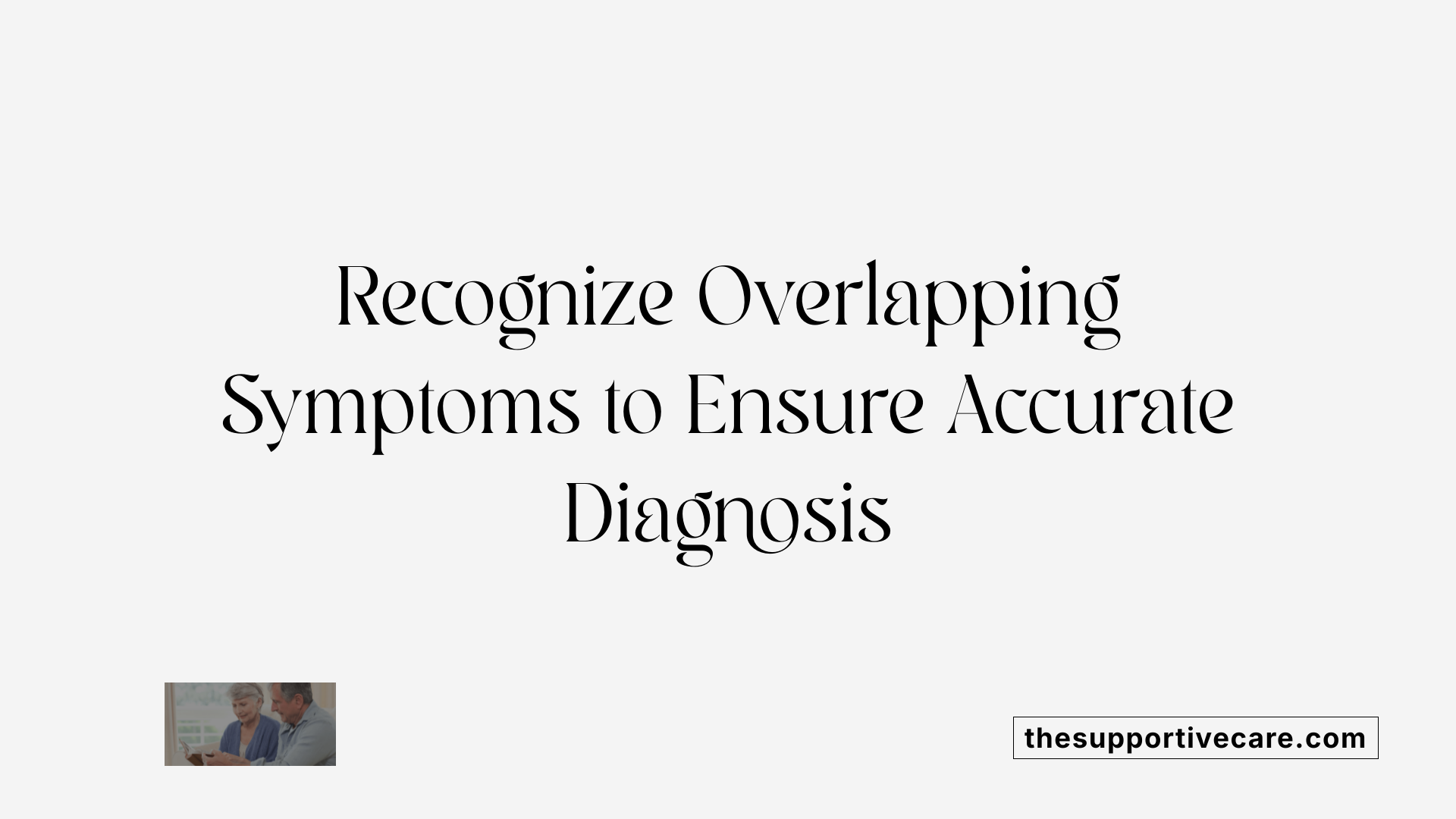 Symptoms of depression in older adults can often resemble those of dementia, making diagnosis challenging. Commonly, depressed seniors may exhibit memory lapses and forgetfulness similar to early signs of neurodegenerative decline. They might also experience difficulty concentrating and mental slowing, which can cause confusion and affect daily functioning.
Symptoms of depression in older adults can often resemble those of dementia, making diagnosis challenging. Commonly, depressed seniors may exhibit memory lapses and forgetfulness similar to early signs of neurodegenerative decline. They might also experience difficulty concentrating and mental slowing, which can cause confusion and affect daily functioning.
Disorientation and fluctuations in cognitive abilities are also seen, often mistaken for dementia progression. Additionally, symptoms such as apathy, low motivation, and psychomotor retardation—where movements become sluggish—can contribute to the appearance of cognitive decline.
Interestingly, these depression-related symptoms tend to be more variable and responsive to treatment compared to true dementia. For example, some patients show rapid improvement in cognitive functions after starting antidepressant therapy or psychotherapy.
Furthermore, deficits in executive functioning—like problem-solving and planning—and language problems are often present in depression but are not typically prominent in early dementia stages. Recognizing these overlapping features is vital because they can mislead clinicians into diagnosing dementia when the underlying cause is depression. Correct identification allows for targeted treatment, which can significantly improve cognitive and emotional symptoms, avoiding unnecessary progression of neurodegenerative disease.
Clinical Features for Differentiating Depression from Dementia
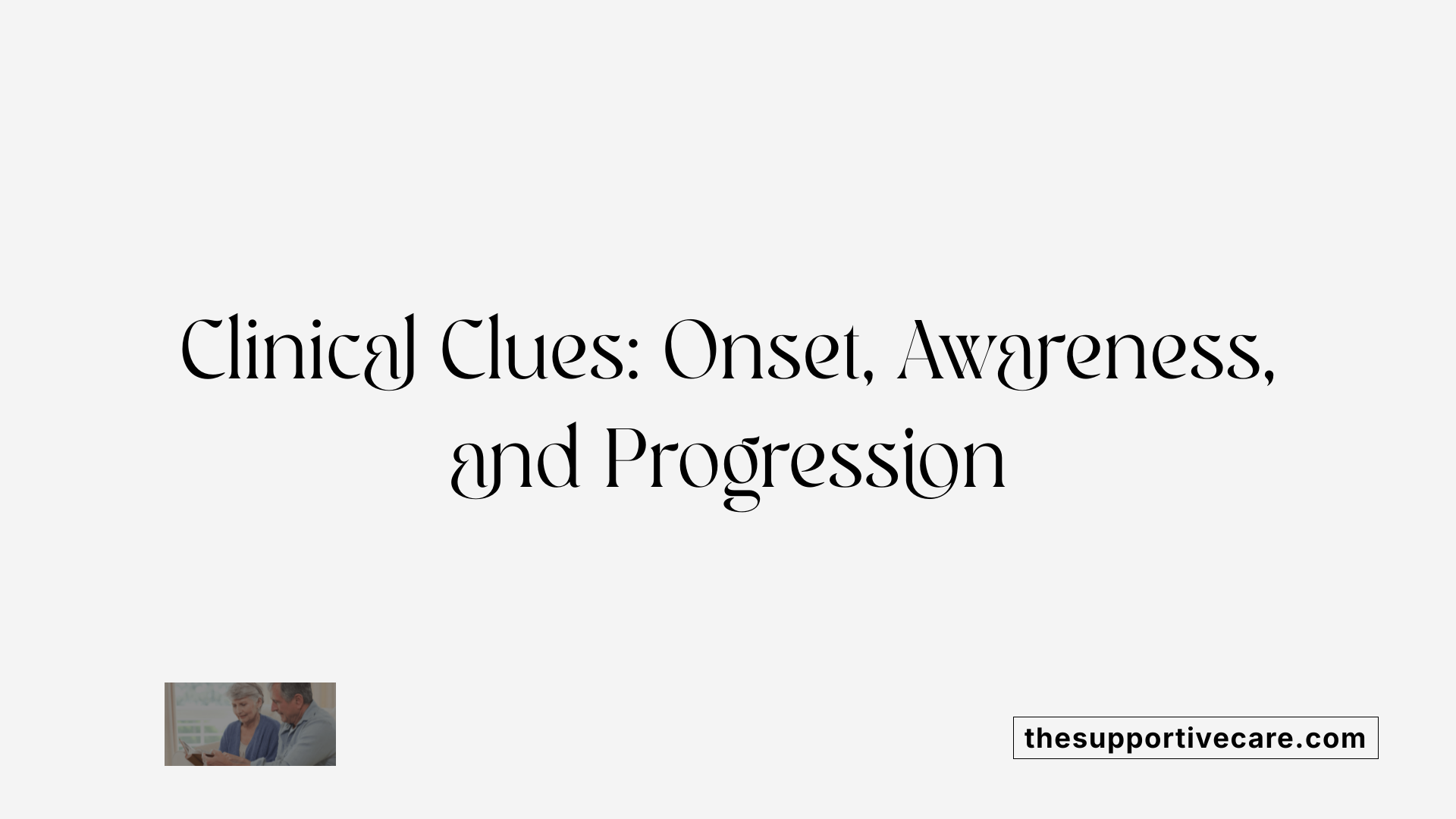
How can clinicians differentiate between depression-related cognitive impairment and dementia in older adults?
Differentiating depression from dementia in older adults can be challenging due to overlapping symptoms. However, careful assessment of the onset, course, and patient awareness of their condition provides crucial clues.
Depression-related cognitive issues often come on suddenly or fluctuate over short periods, making the course appear rapid or episodic. In contrast, dementia tends to develop gradually and progressively over months or years.
Neuropsychological testing helps distinguish the two. Tests like the Mini-Mental State Examination (MMSE) reveal different patterns—depression often affects attention and concentration, which tend to improve with treatment, whereas dementia involves more persistent deficits in memory, reasoning, and executive function.
Patient insight is vital; individuals with depression usually recognize their memory problems and may express concern, showing some awareness of their difficulties. After effective depression treatment, these cognitive issues often improve or resolve.
On the other hand, people with dementia usually demonstrate less awareness or concern about their memory lapses and tend to deny or be indifferent to their decline.
Behavioral and psychiatric features can also aid diagnosis. Depression is frequently accompanied by prominent mood symptoms, such as persistent sadness, anxiety, sleep disturbances, and appetite changes. Dementia patients may display early signs like disorientation, difficulty recognizing familiar people, or challenges with daily tasks.
A practical approach involves a trial of antidepressant therapy. If cognitive symptoms improve with depression treatment, it suggests a reversible pseudodementia. Persistent memory problems despite adequate depression management may indicate underlying neurodegeneration requiring further evaluation.
In summary, successful differentiation relies on evaluating the pattern and progression of symptoms, neuropsychological assessments, insight levels, and responses to targeted therapy for depression.
Clinical Features That Help Differentiate Depression from Dementia
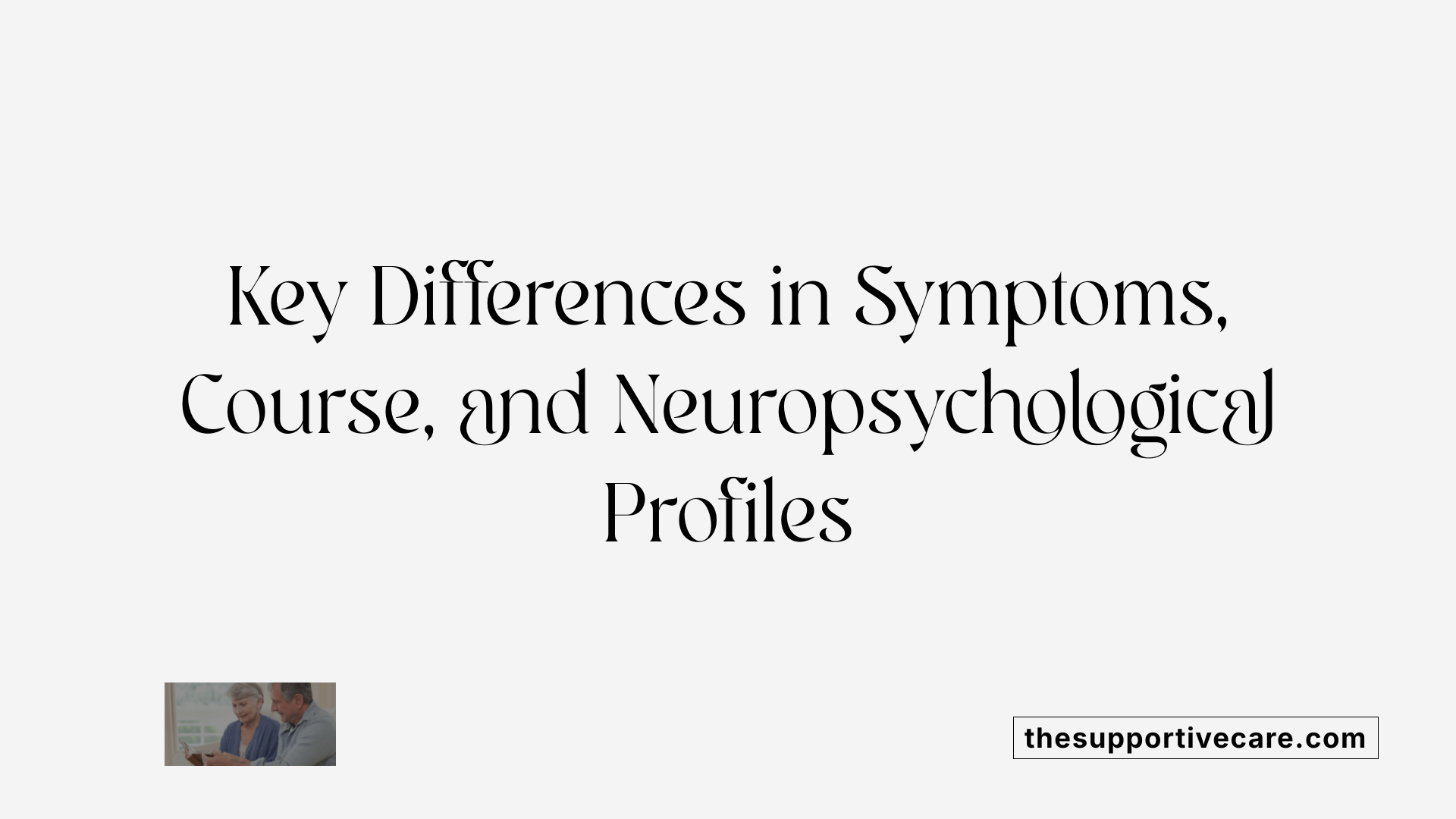
Onset and progression of symptoms
One of the most notable differences between depression and dementia in older adults is how symptoms develop over time. Depression often has a relatively rapid onset, sometimes developing within weeks to months. Its symptoms can fluctuate and may improve noticeably with treatment.
In contrast, dementia typically progresses gradually over many months or years. The decline in cognitive functions such as memory and reasoning worsens steadily, making it a chronic and progressive condition.
Mood symptoms and patient awareness
Depression usually presents with prominent mood-related symptoms such as feelings of sadness, worthlessness, hopelessness, and irritability. Patients are often aware of their difficulties and may explicitly complain about memory problems or concentration issues.
In dementia, individuals often exhibit less awareness of their cognitive deficits. They might deny or be unaware of their memory lapses or behavioral changes, which is known as anosognosia.
Reversibility of cognitive impairments
Cognitive issues associated with depression, often called 'pseudodementia,' tend to be reversible when the underlying depression is effectively treated with antidepressants or psychotherapy. Improvement of mood often leads to a corresponding improvement in cognitive functions.
On the other hand, dementia involves irreversible neurodegenerative changes. While some symptoms can be managed, the progressive decline usually continues despite treatment.
Neuroimaging and neuropsychological profiles
Neuroimaging studies provide additional clues: brain scans in dementia show characteristic atrophy—particularly in the hippocampus and other specific areas—whereas those with depression often show normal or only mildly altered brain structures.
Neuropsychological testing reveals patterns that distinguish these conditions. Depression typically affects attention and executive functions more than core memory, while dementia, especially Alzheimer's disease, predominantly impairs short-term memory and language.
Motor skills and daily functioning
Patients with depression generally maintain their motor skills and daily routines, although they may report fatigue or sluggishness. Their speech and writing remain unaffected.
Conversely, dementia often involves difficulties with orientation, problem-solving, and performing everyday activities, alongside impairments in speech and motor coordination.
Understanding these differences helps clinicians make accurate diagnoses, guiding appropriate treatment strategies to improve outcomes.
| Aspect | Depression | Dementia | Additional Notes |
|---|---|---|---|
| Onset | Rapid (weeks to months) | Gradual (months to years) | Depression symptoms can come on suddenly, dementia develops slowly. |
| Patient awareness | Usually aware of difficulties | Often unaware of deficits | Depression patients often recognize their decline, dementia patients may not. |
| Reversibility | Usually reversible with treatment | Typically irreversible | Cognitive improvement is seen in depression after therapy; dementia declines continue. |
| Brain imaging | Usually normal or mild changes | Brain atrophy, hippocampal shrinkage | Imaging supports differential diagnosis. |
| Key cognitive issues | Attention, executive function | Memory, reasoning, language | Different cognitive domains are affected. |
| Motor skills and daily function | Generally preserved | Often impaired | Daily living activities decline in dementia, less so in depression. |
Recognizing these distinctions enables healthcare providers to choose more effective treatment paths, ultimately leading to better care for older adults facing cognitive and mood changes.
Importance of Accurate Diagnosis in Treatment Planning
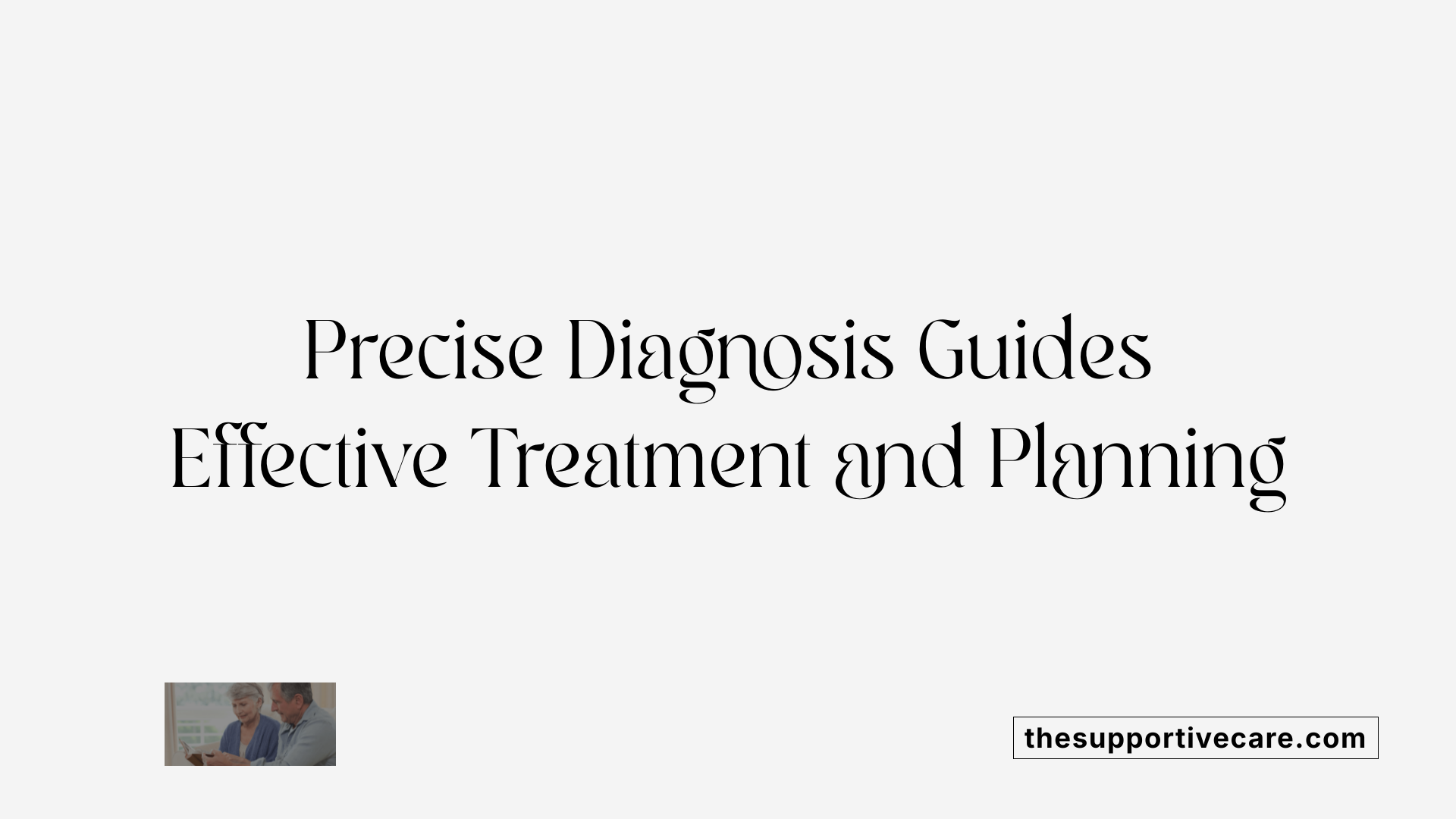 Recognizing whether an older adult is suffering from depression or dementia is fundamental for effective treatment and management. These conditions, while sharing some similar symptoms such as forgetfulness or mental slowing, require vastly different approaches.
Recognizing whether an older adult is suffering from depression or dementia is fundamental for effective treatment and management. These conditions, while sharing some similar symptoms such as forgetfulness or mental slowing, require vastly different approaches.
When depression is correctly diagnosed, it is often treatable and reversible. Therapeutic options like antidepressants—particularly SSRIs—and psychotherapy such as cognitive-behavioral therapy can greatly enhance the patient's quality of life. Physical activity, social engagement, and routine support are also beneficial components of treatment.
In contrast, dementia involves a gradual, irreversible decline in cognitive functions caused by neurodegenerative processes. Early diagnosis allows for planning, support, and the implementation of strategies that help maintain independence for as long as possible. It also enables patients and families to make informed decisions about care and future planning.
Misdiagnosing depression as dementia or vice versa can lead to inappropriate treatment—such as unnecessary medications, or missing out on effective therapies. For instance, prescribing antipsychotics or other dementia-targeted drugs in cases of pseudodementia may not provide relief and could cause adverse effects.
Accurate diagnosis ensures personalized care, optimizes health outcomes, and helps prevent unnecessary interventions. Medical assessments often include neuropsychological testing, medical history, physical exams, blood tests, and neuroimaging when needed.
Finally, distinguishing between depression and dementia affects long-term prognosis and planning. Depression may resolve with proper treatment, whereas dementia usually progresses despite interventions. Understanding these differences helps caregivers and healthcare providers develop tailored support plans, addressing both medical needs and emotional well-being.
| Aspect | Depression | Dementia | Implication for Care |
|---|---|---|---|
| Treatment Approach | Antidepressants, therapy, lifestyle changes | Supportive care, cognitive therapies, advanced planning | Proper diagnosis directs suitable interventions |
| Course | Usually reversible with treatment | Progressive and irreversible | Influences long-term planning and expectations |
| Symptom Overlap | Memory issues, slow thinking, apathy | Memory loss, disorientation, personality change | Differentiation crucial for effective care |
| Impact on Quality of Life | Often improves with treatment | May continue to decline | Early diagnosis can improve quality of life |
Accurate differentiation between depression and dementia in older adults is essential for delivering appropriate treatments, enhancing patient outcomes, and guiding caregivers and families through planning and support. Proper assessment tools and clinical judgment are integral to this process, underscoring the importance of comprehensive evaluation in geriatric care.
Diagnostic and Screening Strategies for Elderly Patients
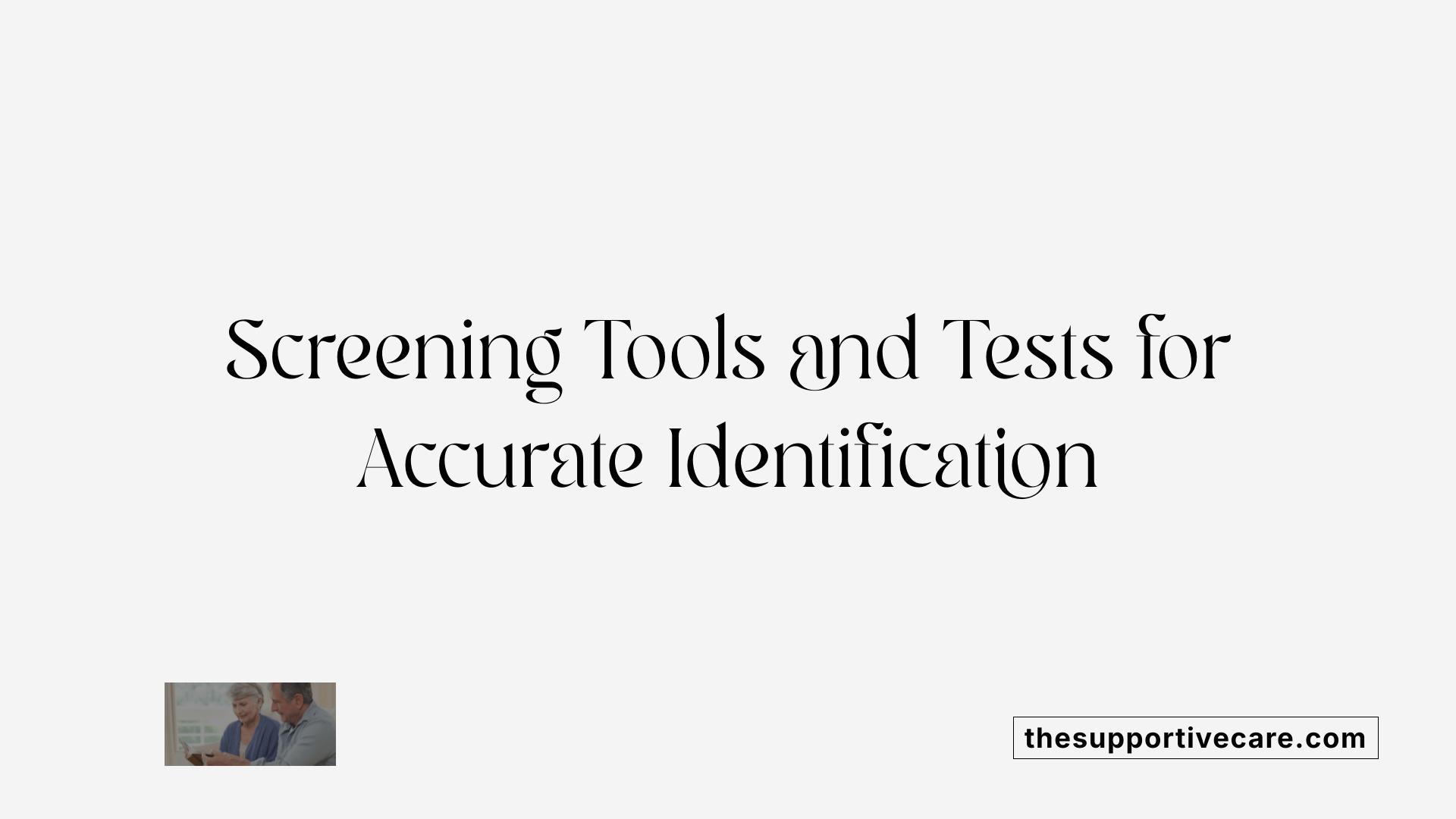
How are depression and dementia in elderly patients diagnosed and screened for?
Diagnosing depression and dementia in older adults requires a multifaceted approach, combining clinical assessments, screening instruments, and sometimes medical testing.
Screening tools like the Geriatric Depression Scale (GDS) and the Patient Health Questionnaire-9 (PHQ-9) are commonly used to detect depressive symptoms. These questionnaires help identify mood issues that might otherwise be overlooked, especially since depression in the elderly can present with atypical features such as sleep disturbances, physical complaints, or irritability without a prominent depressed mood.
For cognitive decline, initial screening often involves simple, quick tests such as the Mini-Mental State Examination (MMSE) or the Memory Impairment Screen. These tools assess various cognitive domains, including memory, language, and orientation. They aid in identifying problems that warrant more detailed evaluation.
In addition to cognitive tests, neuropsychological assessments can provide a comprehensive profile of a patient's cognitive strengths and weaknesses, helping differentiate between depression-related pseudodementia and true neurodegenerative dementia.
Advanced diagnostics like neuroimaging (MRI or CT scans) and biomarkers are valuable when diagnosis remains unclear or when early or atypical symptoms are present. They can help detect structural changes, vascular abnormalities, or other pathologies related to dementia.
Obtaining a detailed medical history and conducting clinical interviews are crucial. This involves discussing symptom onset, progression, mood, social functioning, and medical comorbidities. Physical examinations and blood tests help identify underlying medical conditions—such as thyroid issues, infections, or metabolic imbalances—that may contribute to cognitive or mood disturbances.
Since symptoms of depression and dementia often overlap, observing the course of symptoms, response to treatments, and specific neuropsychological patterns assists in accurate diagnosis. Persistent or worsening cognitive issues despite depression treatment may indicate underlying dementia.
Follow-up assessments are essential to monitor treatment response, detect changes over time, and refine diagnoses. Regular reevaluation using the same screening tools and clinical judgment ensures that treatment plans remain targeted and effective.
Proper diagnosis enables tailored interventions—whether psychotherapy, medications like antidepressants, or neurological treatments—aimed at improving quality of life and functional independence for elderly patients.
Interventions and Supportive Measures for Overlapping Symptoms
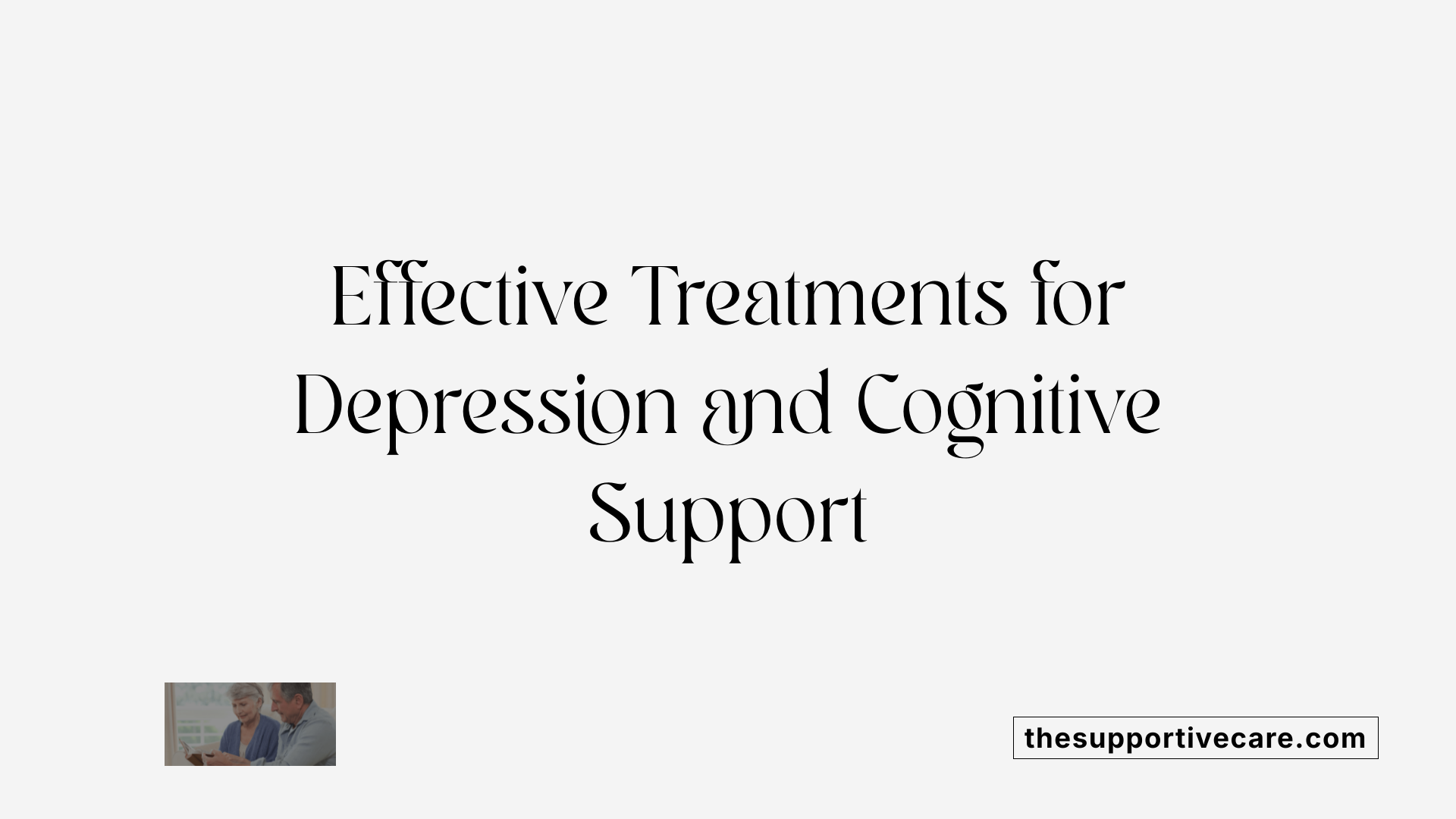
What treatments are effective for depression in the elderly, especially when comorbid with cognitive impairment?
Treating depression in older adults, particularly when cognition is affected, involves a combination of pharmacological and non-pharmacological strategies. Antidepressant medications, especially selective serotonin reuptake inhibitors (SSRIs), are frequently used and can help improve mood and cognitive symptoms.
Psychotherapy approaches such as cognitive-behavioral therapy (CBT) are effective, particularly when tailored to address issues like executive dysfunction. Non-pharmacological options like cognitive remediation, including neuroplasticity-based computerized training, show promise for improving specific cognitive deficits linked with depression.
In addition to direct treatment, addressing comorbid medical conditions—such as thyroid disorders, infections, or metabolic issues—is crucial. Managing these underlying health problems can alleviate some cognitive and mood symptoms.
Role of social support, routine, and engagement
Social support plays a vital role in managing depression and cognitive decline. Support groups, engaging in meaningful activities, and maintaining social interactions can reduce feelings of isolation. Consistent routines and daily activities provide psychological stability and help maintain cognitive function.
Physical activity is another beneficial intervention, with regular exercise associated with mood improvements and neuroplasticity benefits. Encouraging participation in hobbies and social activities fosters a positive environment and enhances overall well-being.
Addressing comorbid medical conditions
Many medical conditions, such as vascular disease, diabetes, or sensory impairments, contribute to cognitive and mood symptoms. Proper diagnosis and management of these issues—through medication, lifestyle changes, or medical procedures—are essential for optimal patient outcomes.
Use of non-pharmacological approaches like cognitive remediation
Cognitive remediation techniques, especially targeted at executive functions, can improve treatment response. Computerized cognitive training, focused on problem-solving and memory tasks, supports neuroplasticity and helps patients regain some cognitive control.
Long-term management and caregiver involvement
Maintaining a long-term management plan involves regular follow-ups, monitoring symptom progression, and adjusting treatments as needed. Caregivers play a crucial role by providing support, facilitating adherence to therapy, and helping recognize early signs of relapse.
Education and support for caregivers help reduce their burden and improve patient care. An integrated approach—combining medical treatment, psychosocial support, and environmental modifications—can significantly improve quality of life for older adults experiencing overlapping symptoms of depression and cognitive impairment.
The Role of Medical and Laboratory Investigations in Differentiation
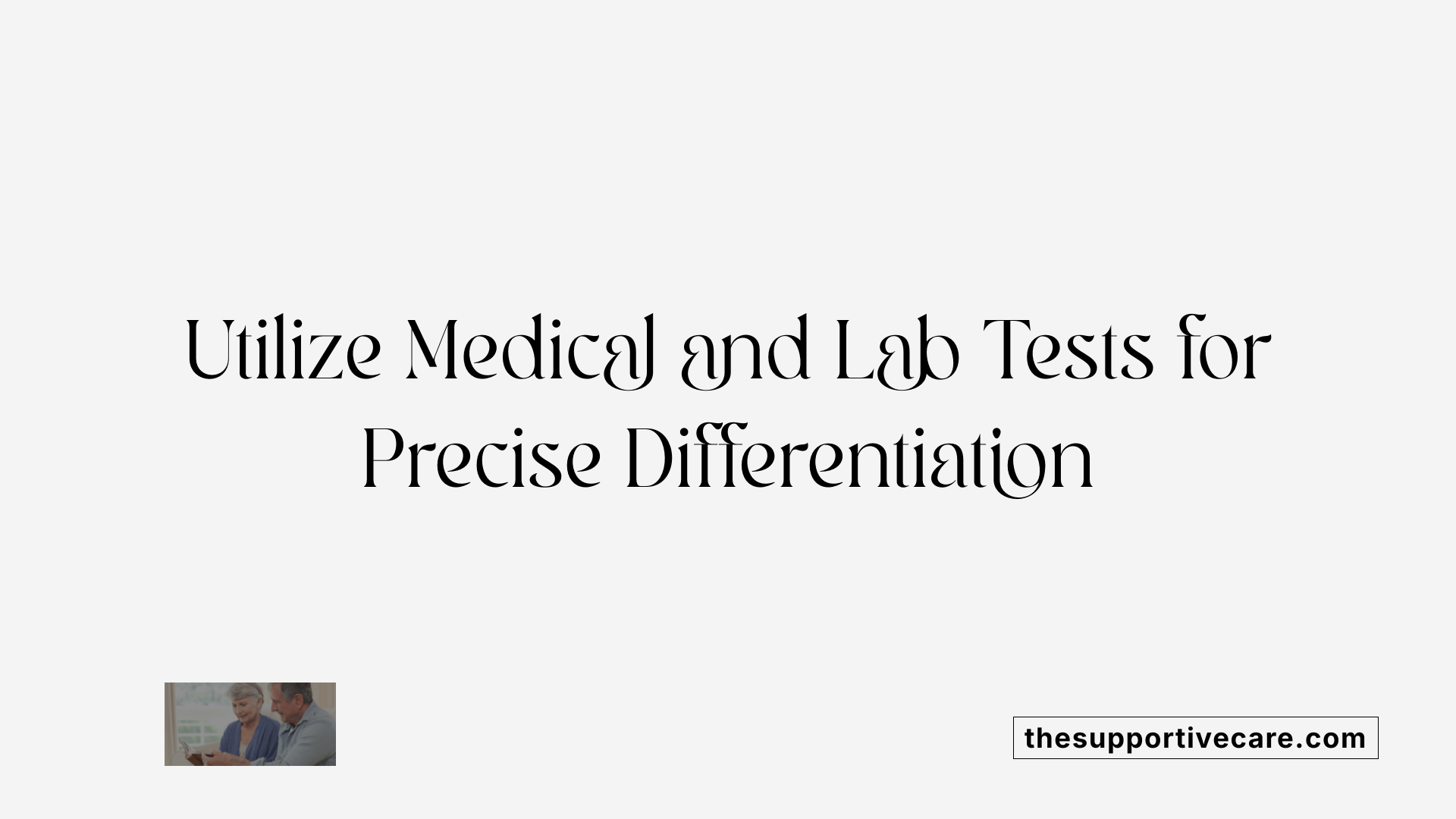 In older adults presenting with cognitive decline or mood disturbances, medical and laboratory investigations are crucial for accurate diagnosis. These tools help distinguish depression from dementia, ensuring appropriate treatment plans are implemented.
In older adults presenting with cognitive decline or mood disturbances, medical and laboratory investigations are crucial for accurate diagnosis. These tools help distinguish depression from dementia, ensuring appropriate treatment plans are implemented.
Blood tests are often the first step in evaluation. They help rule out systemic conditions such as thyroid hormone imbalances, vitamin deficiencies (like B12 or folate), infections, or metabolic disorders that can mimic or worsen cognitive symptoms or depression. Correctly identifying and managing these conditions can significantly improve the patient's mental state.
Imaging studies, including Magnetic Resonance Imaging (MRI) and Computed Tomography (CT) scans, play a vital role in assessing brain structure. These scans can reveal signs of neurodegeneration characteristic of Alzheimer’s disease, cerebrovascular disease, or structural brain lesions such as tumors or hydrocephalus. MRI, in particular, provides detailed images that help identify brain atrophy patterns or vascular changes.
Assessment of systemic health factors is also essential. Tests for thyroid function, screening for vitamin deficiencies, and reviewing medication effects contribute to understanding the causes of cognitive impairment. For example, thyroid disorders or medication side effects can produce reversible symptoms that resemble dementia or depression.
Advanced imaging techniques and biochemical markers are increasingly utilized for early detection of Alzheimer's pathology. Biomarkers such as amyloid or tau proteins, detected through cerebrospinal fluid analysis or imaging, can help confirm the diagnosis of neurodegenerative dementias.
Most importantly, thorough investigations are necessary to exclude treatable or reversible causes that often mimic irreversible dementia. Conditions like normal pressure hydrocephalus are potentially reversible with surgery, and thyroid or vitamin issues can be corrected with appropriate medication.
Performing comprehensive medical and laboratory assessments ensures clinicians accurately differentiate between depression and dementia in elderly patients. This differentiation is crucial because the management strategies and prognoses differ significantly, with depression often being treatable and dementia progressing steadily if untreated.
The Path Forward in Accurate Diagnosis and Management
Accurate diagnosis of depression versus dementia in the elderly hinges on a multidimensional approach, incorporating clinical assessment, neuropsychological testing, imaging, and medical investigations. Recognizing the overlapping yet distinct features of these conditions facilitates appropriate interventions, ultimately improving quality of life for affected individuals. Clinicians must remain vigilant for depressive pseudodementia and other reversible causes of cognitive impairment, ensuring timely, targeted treatment. Ongoing research into biomarkers and innovative therapies promises to enhance diagnostic accuracy and therapeutic outcomes in this vulnerable population.
References
- Is it dementia or depression?
- Depression and Dementia in Older Adults
- Pseudodementia: Causes, treatment, and more
- Differentiating among Depression, Delirium, and Dementia in ...
- Why Is Depression Often Mistaken for Dementia?
- Medical Conditions That Can Mimic Dementia
- Cognitive Impairment in Depressed Older Adults
- What do we know about pseudodementia?
- How Depression Can Mimic or Mask Dementia Symptoms
- Depression and dementia


































































































